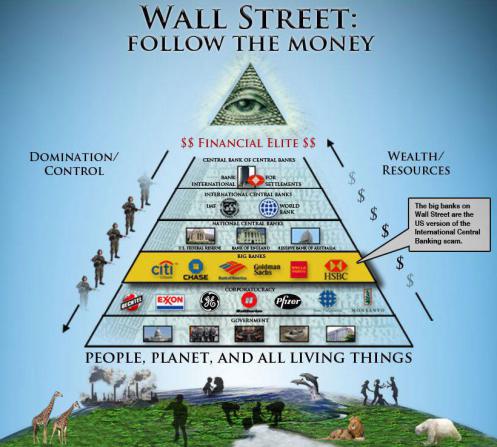Migchels - The Matrix is Made of Money
December 21, 2014
Monetary reformer Anthony Migchels endorses
two new documentaries available on YouTube
saying "they certainly widened my horizons."
Understanding how we are controlled is necessary
to breaking free.
by Anthony Migchels
Two Brilliant Films
(abridged by henrymakow.com)
Two new films perfectly expose how the financial system dominates the globe by centralizing wealth and power through Usury, the manipulation of money, and credit allocation.
They prove history is not a matter of competing nation states, but of a shadowy elite that rules the world through control of money. We are indeed slaves and the Matrix owns us, lock, stock and barrel.
Understanding how it all came about is impossible without a basic grasp of how their control of money governs our lives.
 (left. The pyramid of power)
(left. The pyramid of power)These two films, 'Renaissance 2.0 - Financial Empire' and 'Princes of the Yen, Central Banks and the Transformation of the Economy' paint a crystal clear picture of the main issues. They certainly widened my horizons.
The first focusses on the effects of Usury, the second on how Central Banks create booms and busts. It also explains in simple and direct terms what power there is in credit allocation.
This film was created by Damon Vrabel. Here's an interesting article by him on Usury. His basic take is very sound, focussing on its exponential nature:
"The exponential math not only creates exponential debt growth, but also exponentially increasing:
Scale - government and businesses keep getting bigger; we get smaller and local communities lose their meaning
Velocity - the hamster wheel keeps spinning faster; human life suffers
Consumption - we buy more and more things that break more quickly
Production - we make more and more things that break more quickly
Inflation - the dollar buys less and less; we can't seem to make progress
None of these things have to happen in an economic system. They only happen in ours because of debt-based money, usury, that greatly benefits the top of the pyramid while everyone else suffers according to their level in the pyramid.
So this system is guaranteed to fail due to not only the impossible math, but also the fundamental immorality. Taken together those five issues paint a horrible picture."
The film is basically a presentation he put together. It's well done, with clear cut visuals that center around the pyramid of power. It greatly helps to keep this picture in mind always. It's simply the nature of power and it's behind all their schemes, from Libertarianism to Marxism.
 Vrabel points at the two tier society that is automatic with Usury. He discusses many interesting dynamics of the monetary system, pointing at the different implications for those in their respective layers of the pyramid. For instance how cost for capital rises when you go lower into the pyramid.
Vrabel points at the two tier society that is automatic with Usury. He discusses many interesting dynamics of the monetary system, pointing at the different implications for those in their respective layers of the pyramid. For instance how cost for capital rises when you go lower into the pyramid.Another great feature is his critique of 'modern economics'. He makes a solid case, showing once more how ridiculous it all really is. It's very important. We must rid ourselves of the heinous nonsense that they pay their academics to produce. It's all nonsense, existing only to explain why we must be in bondage.
----
Whole article and discussion of the second film appear here
Anthony Migchels is an Interest-Free Currency activist and founder of the Gelre, the first Regional Currency in the Netherlands. You can read all of his articles on monetary reform on his blog Real Currencies.
Related:
How Usury Encloses The Commons
Banking Is Institutionalized Murder!
Capitalism Is Jewish Usury
Rationalizing Usury: the Time Value Hoax
Derivatives, Or: How The Money Power Created The Greatest Depression
The Goal of Monetary Reform
Understand that the Banking System is One
The Silly Pseudo Science that is 'Modern Economics'
First Comment from Tony B:
I find it interesting that this sort of thing is always very much "old news" but always also "new news." People in any numbers just don't seem to be able to accept that the money systems in most of the world are purposely dysfunctional for the very reasons almost always presented. Even when the people themselves obviously suffer those named symptoms.
Creating real money for exchanges needed in life is such a simple matter that anyone opposing it should be at least imprisoned as an enemy of right order.
Also, "credit allocation" is a nonexistent problem when the phony credit game is replaced by real money SPENT or GIVEN into circulation, there to stay. There was no "credit allocation" with greenbacks. Like any real money, they existed in circulation to be used free of charge by whomever acquired them after being SPENT into existence. Too many money "reformers" cannot separate the movements of credit and the differing movements of proper money in their thinking. Credit is someone else's property being loaned at a price. True money is NOT loaned by its creator, it is spent for goods/services or given away.







Dean said (December 25, 2014):
It is the solution to poverty in the land of plenty. Yes I said plenty. There is only one thing there is a shortage of: MONEY.
Now idiots and TPTB are the only forces I know of who deny the one credible, fully articulated and thought-out solution that exists to properly and equitably share this incredible wealth that technology has gifted mankind and that is SOCIAL CREDIT. You are a thinking man so I encourage you to do one thing. THINK about what I just said and do a little homework to see if what Wally tried to tell you is bullshit or not. It is not. You said it is too technical? Well then have a look at this. www.economiccuresl.com. Is that simple enough for you.
You are as close to being part of the solution while actually being the problem that I know of. How are you part of the problem? You are telling the poor bastard that is suffering because his foot is being pounded by a hammer that we need to outlaw hammers when the solution is as close as the nose on both of your faces. It is the hammer in the hand of the bastard hitting him.
Why is there as shortage of money? That answer is simple – THE GAP. Now what is the gap and how do you fix it? Read this
http://www.economiccuresl.com/
or look up social credit on Wikipedia or check out www.socred.org
The key to eliminating debt slavery is to figure out an economic policy that eliminates the need for it. Simple. End of story.
--
Thanks Dean for this short and clear exposition,
The problem is not that we lack a solution, but that we lack the power to implement one.
henry